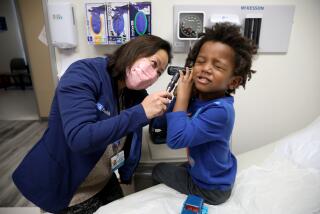There are limits to how much a doctor or hospital may charge for medical records
- Share via
How do I find the best nursing home for my mom? Can I fight hospital charges that seem wrong? There are so many details to keep track of when trying to get good healthcare it can be enough to make the savviest among us throw up our hands.
That’s the reason for this new column, Health 411. Write to us if you find yourself with some health-related head-scratcher (contact information is at the end of the article) and we’ll try our best to guide you. No, we can’t take on your insurance company when it’s refusing to pay for a brand-name drug, and we don’t “know a guy” who can go after the doctor who botched your nose job and still charged you a fortune for it. But we can talk to the experts and tell you where to go or what steps to take to get the help you need.
Read on for the first batch of questions and answers.
Can a doctor’s office or hospital charge me for a copy of my medical records?
Yes, they can. But that doesn’t mean the sky’s the limit when it comes to setting a fee.
Your right to view and get a copy of your medical records is protected under the federal Health Insurance Portability and Accountability Act and laws in many states, including California. Healthcare providers may charge reasonable fees to make the copies (they can’t charge for simply reviewing your records). In California, the cost cannot exceed 25 cents per page for photocopies and 50 cents per page for microfilm. If you prefer a summary of your records rather than a copy, your doctor can charge you a reasonable fee to prepare one, although the law doesn’t specify in this case what “reasonable” is.
If you want your medical records mailed, you may have to pay the cost of postage.
Healthcare providers must respond to your request in a timely manner. In California, you must be given access to your medical records within five business days of receipt of your written request and sent a copy within 15 business days. Your doctor can withhold the records, however, until you pay the required fees.
For a full listing of consumer rights guaranteed by HIPAA, go to https://www.hhs.gov/ocr. For rules for your state, go to the website for Georgetown University’s Center on Medical Record Rights and Privacy is a great resource.
If you feel you’re being overcharged or having problems getting your records, generally the first place to start is with your state medical board, says Jennifer Simones, chief of legislation at the Medical Board of California. (In California, go to https://www.medbd.ca.gov and navigate to the consumer portion of the site; links to all state medical boards are at the American Medical Assn. website, under the education and careers tab.)
You can also initiate a complaint with the Department of Health and Human Services Office for Civil Rights. Information can be found online at https://www.hhs.gov/ocr.
If you have heart attack symptoms and call 911, can you ask the paramedics to take you to the hospital where your doctor practices?
You can ask. But whether your request is granted depends upon various factors, including the severity of your condition and how much more time, if any, it would take to transport you to another appropriate hospital, says Dr. Ramon Johnson, chairman of the Board of Directors of the American College of Emergency Physicians.
Policies about where patients are taken in emergency situations are typically set by local emergency medical services agencies. Though policies vary by county, most dictate that the health and well-being of the patient are overriding factors.
If paramedics determine a heart attack is taking place, you’ll be taken to the nearest STEMI receiving center. STEMI stands for ST Elevation Myocardial Infarction … a heart attack, to you and me.
STEMI centers have a designated team to receive patients in cardiac arrest and have access to a catheterization lab, where patients are immediately taken so that the affected artery can be unblocked. “The shorter the time between the patient being evaluated and getting to the cath lab and opening up the artery can make a difference as to whether you have significant damage to your heart or not,” Johnson says.
If your doctor doesn’t practice at the nearest STEMI receiving center, paramedics will not transport you to the hospital where he or she practices unless it too is a STEMI center, Johnsons says. If it is, and the time to get you there does not pose a significant risk, they may oblige your request.
“What you don’t want to do is bypass a center … to take the patient to another place that’s a few minutes further,” Johnson says. “Those few minutes can make the difference between life and death.”
My doctor wants me to visit a private facility for several CT scans. I know that this facility is near a hospital that was involved in radiation overexposure of patients because equipment was not properly calibrated. How can a prospective consumer find out if an imaging center is safe?
There is no one place consumers can go to check on the quality of imaging centers. Still, there are resources to help evaluate if the provider delivers quality care.
Imaging centers must be licensed by the state in which they operate (most imaging centers in California, for example, are licensed by the California Department of Public Health or, if operated under physician licenses, the Medical Board of California). In addition, most centers conducting advanced imaging services — such as CT scans, MRIs and PET scans — are either required, or choose to seek, accreditation from private organizations that evaluate their performance against a set of quality and safety standards.
Soon many will have no option. By Jan. 1, a new federal law will require all independent outpatient imaging centers and physician practices providing imaging services under Medicare to be accredited by one of three organizations. Providers can choose which one to work with.
In the wake of the radiation overdoses that occurred at Cedars-Sinai Medical Center, California has gone a step further by passing a law that will require all facilities conducting CT X-rays to be accredited by July 2013, either by one of the medical board-approved agencies or by others recognized by the state (more at https://www.mbc.ca.gov; go to the A-Z Index under “Quick Links” on the home page and then to “outpatient surgery settings”). The law also requires that the radiation dose delivered with a scan be recorded on the image and the patient’s medical records.
Here are some steps you can take to check on facilities. Look to see that an imaging center is accredited with one of the three designated organizations: the American College of Radiology, the Intersocietal Accreditation Commission and the Joint Commission.
Facilities accredited by the American College of Radiology, for example, will show up on a list when you search by location and/or type of test you’re getting. (Go to https://www.acr.org, hit “accreditation” followed by “accredited facility search”). The site will tell you a facility’s accreditation status as well as the date accreditation expires.
The Intersocietal Accreditation Commission lists group and independent providers practicing in a range of specialties, such as cardiology and orthopedics, who sometimes operate imaging equipment in their private office. You can locate an accredited provider by ZIP Code through its website, https://www.QualityMedicalTesting.org.
On the Joint Commission’s website, https://www.qualitycheck.org, you can search by a hospital or imaging facility name, ZIP Code or state. There you’ll find accreditation history and how a facility has performed compared with similar organizations throughout the state and country.
But you won’t find specific complaints listed on any of the sites. If a provider has had trouble, it probably won’t be reflected in the data for some time, if at all.
Humans operating highly developed technology inevitably create risks, says Michael Kulczycki, executive director of the Ambulatory Care Accreditation Program with the Joint Commission. “There will always be a chance for error. You can’t legislate or accredit your way out of that.”
Zamosky has been writing about how to access and pay for healthcare for more than 10 years.
Got a healthcare dilemma? Email health411@latimes.com or write to Health 411, Los Angeles Times Health, 202 W. 1st St., Los Angeles, CA 90012.
More to Read
Inside the business of entertainment
The Wide Shot brings you news, analysis and insights on everything from streaming wars to production — and what it all means for the future.
You may occasionally receive promotional content from the Los Angeles Times.










